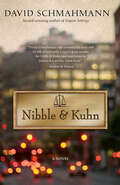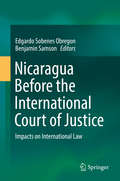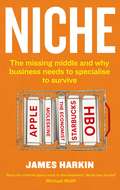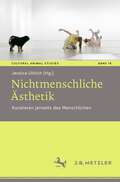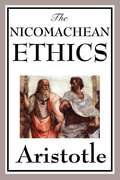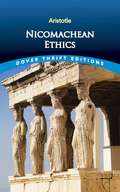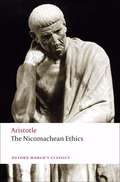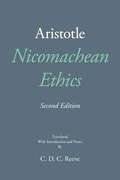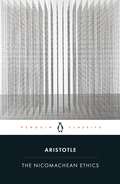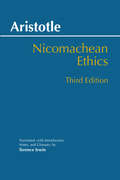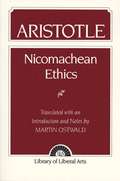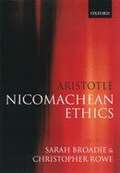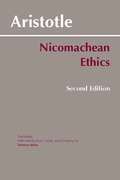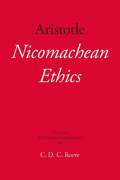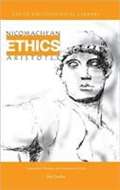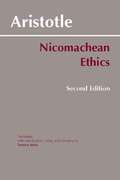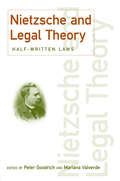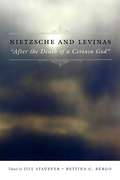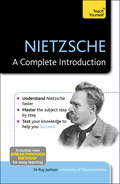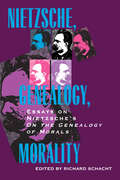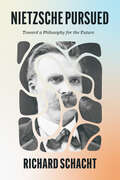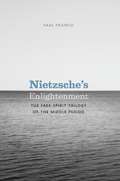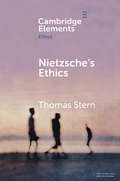- Table View
- List View
Nibble & Kuhn: A Novel
by David SchmahmannA young lawyer in a pretentious law firm loves a girl that he can't have and is forced to try a major case that he can't win, and must do both under the critical scrutiny of senior lawyers who will soon decide whether to promote him to partnership.
Nicaragua Before the International Court of Justice
by Edgardo Sobenes Obregon Benjamin SamsonThis book analyses Nicaragua's role in the development of international law, through its participation in cases that have come before the International Court of Justice. Nicaragua has appeared before the ICJ in fourteen cases, either as an applicant, respondent or intervening State, thus setting an important example of committment to the peaceful judicial settlement of disputes. The "Nicaraguan" cases have enabled the ICJ to take positions on and clarify a whole range of important procedural, jurisdictional and substantive legal issues, which have inspired the jurisprudence of international and regional courts and tribunals and influenced the development of international law. The book focuses on reviewing Nicaragua's cases before the ICJ, using a thematic approach to identify their impact on international law. Each chapter includes a discussion of the relevant cases on a particular theme and their impact over time on general as well as specific branches of international law, notably through their use as precedent by other international and regional courts and tribunals.
Niche: The missing middle and why business needs to specialise to survive
by James HarkinAs high street and main street businesses continue to suffer, there's a new rule in business: forget about the general audience and instead stake out an identifiable niche.Woolworths suffered from a lack of identity and found that low quality and low price wasn't enough; General Motors crashed as motorists failed to distinguish between cars in their range. Yet HBO, Moleskine and specialist media like The Economist have all succeeded by building their authority over narrow areas of expertise and cultivating a passionate following - and their profits have mushroomed. Fascinating and thought-provoking, Niche is a superb examination of how innovation and profitability are moving to a series of tightly defined but globally scattered niches, bound together by the reach of the net.
Nichtmenschliche Ästhetik: Kuratieren jenseits des Menschlichen (Cultural Animal Studies #18)
by Jessica UllrichDer Band verbindet aktuelle Diskurse um nichtmenschliche oder mehr-als-menschliche Akteure in ästhetischen Prozessen mit der derzeit virulenten Debatte um „Care“ bzw. Fürsorgeethik in der Kunst. Gefragt wird nach den Bedingungen, Modi und Konsequenzen einer nichtmenschlichen Ästhetik und danach, in welcher Form Tiere, Pflanzen, Pilze, Mikroben, Bakterien, Maschinen oder künstliche Intelligenzen im Rahmen von Kunstwerken handeln. Die Beiträge beleuchten, wie Künstler*innen mit nichtmenschlichen Entitäten im Rahmen von performativen oder installativen Kunstwerken interagieren und wie sie füreinander sorgen und füreinander verantwortlich sind.
The Nicomachean Ethics
by AristotleNicomachean Ethics focuses on the importance of habitually behaving virtuously and developing a virtuous character. Aristotle emphasized the importance of context to ethical behavior, and the ability of the virtuous person to recognize the best course of action. Aristotle argued that happiness and well being is the goal of life, and that a person's pursuit of such, rightly conceived, will result in virtuous conduct. "EVERY art and every inquiry, and similarly every action and pursuit, is thought to aim at some good; and for this reason the good has rightly been declared to be that at which all things aim." -Aristotle
Nicomachean Ethics (Dover Thrift Editions)
by AristotleHailed by Dante as "the master of those who know," the Greek philosopher Aristotle (384–322 B.C.) surveyed every field of learning known to the ancient world and pioneered the sciences of psychology and logic. A disciple of Plato and the tutor to Alexander the Great, Aristotle was a prolific writer, although many of his works have been lost. His treatises, used by the students of his famous Athenian school, the Lyceum, exerted a profound and lasting influence on Western thought.Aristotle's Nicomachean Ethics is one of the world's great books. Identifying happiness as the goal of life, he rejects pleasure, fame, and wealth as means to it. The summit of human achievement is attainable only through the contemplation of philosophic truth, because this practice exercises the virtue peculiar to the human being, the rational principle.This inexpensive edition of a philosophical landmark will prove an invaluable resource to students and general readers alike.
The Nicomachean Ethics
by AristotleThe Author examines the nature of happiness, which he defines as a specially good kind of life. He considers the nature of practical reasoning, friendship, and the role and importance of the moral virtues in the best life.
Nicomachean Ethics
by AristotleThe second edition of C. D. C. Reeve's translation of Nicomachean Ethics features Bekker numbers in the margins as well as a significantly revised translation that combines accuracy, consistency, and readability and fits seamlessly with the other volumes in the series. Anglophone readers can now read Aristotle's works in a way previously not possible. Sequentially numbered, cross-referenced endnotes provide the information most needed at each juncture, while a detailed Index guides the reader to places where focused discussion of key notions occurs.
The Nicomachean Ethics
by AristotleOne of the most important philosophical works of all time, in a new Penguin Classics translation by Adam Beresford'Right and wrong is a human thing' What does it mean to be a good person? Aristotle's famous series of lectures on ethical topics ranges over fundamental questions about good and bad character; pleasure and self-control; moral wisdom and the foundations of right and wrong; friendship and love in all their forms - all set against a rich and humane conception of what makes for a flourishing life. Adam Beresford's freshly researched translation presents many of Aristotle's key terms and idioms in standard English for the first time, and faithfully preserves the unvarnished style of the original.
Nicomachean Ethics
by AristotleTerence Irwin&’s edition of the Nicomachean Ethics offers more aids to the reader than are found in any modern English translation. It includes an Introduction, headings to help the reader follow the argument, explanatory notes on difficult or important passages, and a full glossary explaining Aristotle&’s technical terms. The Third Edition offers additional revisions of the translation as well as revised and expanded versions of the notes, glossary, and Introduction. Also new is an appendix featuring translated selections from related texts of Aristotle.
The Nicomachean Ethics
by AristotleEnduringly profound treatise, whose lasting effect on Western philosophy continues to resonate. Aristotle identifies the goal of life as happiness and discusses its attainment through the contemplation of philosophic truth. Translated, with notes and introduction by Martin Ostwald.
Nicomachean Ethics
by Aristotle Sarah Broadie Christopher RoweThis work presents the Nicomachean Ethics in a fresh English translation by Christopher Rowe that strives to be meticulously accurate yet also accessible. The translation is accompanied by Sarah Broadie's detailed line-by-line commentary, which brings out the subtlety of Aristotle's thought as it develops from moment to moment. In addition, a substantial introductory section features a thorough examination of the text's main themes and interpretative problems and also provides preambles to each of the ten books of the Nicomachean Ethics. An indispensable resource for students approaching the Nicomachean Ethics for the first time, this detailed treatment is ideal for courses in classical or ancient philosophy, the philosophy of Aristotle, and ethics.
Nicomachean Ethics
by Aristotle Terence IrwinBuilding on the strengths of the first edition, the second edition of the Irwin Nicomachean Ethics features a revised translation (with little editorial intervention), expanded notes (including a summary of the argument of each chapter), an expanded Introduction, and a revised glossary.
Nicomachean Ethics
by C. D. Reeve AristotleAn excellent new translation and commentary. It will serve newcomers as an informative, accessible introduction to the Nicomachean Ethics and to many issues in Aristotle's philosophy, but also has much to offer advanced scholars. The commentary is noteworthy for its frequent citations of relevant passages from other works in Aristotle's corpus, which often shed new light on the texts. Reeve's translation is meticulous: it hits the virtuous mean--accurate and technical, yet readable--between translation's vicious extremes of faithlessness and indigestibility.--Jessica Moss, New York University
Nicomachean Ethics: Translation, Glossary, and Introductory Essay
by Joe Sachs Aristotle Terence IrwinFocus Philosophical Library's edition of Aristotle's Nicomachean Ethics is a lucid and useful translation of one of Aristotle's major works for the student of undergraduate philosophy, as well as for the general reader interested in the major works of western civilization. This edition includes notes and a glossary, intending to provide the reader with some sense of the terms and the concepts as they were understood by Aristotle's immediate audience. Focus Philosophical Library books are distinguished by their commitment to faithful, clear, and consistent translations of texts and the rich world part and parcel of those texts.
Nicomachean Ethics (2nd Edition)
by Aristotle Terence IrwinBuilding on the strengths of the first edition, the second edition of the Irwin Nicomachean Ethics features a revised translation (without extensive editorial intervention), expanded notes (including a summary of the argument of each chapter), an expanded Introduction, and a revised glossary.
Nietzsche and Legal Theory: Half-Written Laws (Discourses Of Law Ser.)
by Mariana Valverde Peter GoodrichNietzsche and Legal Theory is an anthology designed to provide legal and socio-legal scholars with a sense of the very wide range of projects and questions in whose pursuit Nietzsche's work can be useful. From medical ethics to criminology, from the systemic anti-Semitism of legal codes arising in Christian cultures, to the details of intellectual property debates about regulating the use of culturally significant objects, the contributors (from the fields of law, philosophy, criminology, cultural studies, and literary studies) demonstrate and enact the sort of creativity that Nietzsche associated with the "free-spirits" to whom he addressed some of his most significant work.
Nietzsche and Levinas: "After the Death of a Certain God" (Insurrections: Critical Studies In Religion, Politics and Culture)
by Bettina Bergo Jill StaufferThe essays that Jill Stauffer and Bettina Bergo collect in this volume locate multiple affinities between the philosophies of Nietzsche and Levinas. Both philosophers question the nature of subjectivity and the meaning of responsibility after the "death of God." While Nietzsche poses the dilemmas of a self without a ground and of ethics at a time of cultural upheaval and demystification, Levinas wrestles with subjectivity and the sheer possibility of ethics after the Shoah. Both argue that goodness exists independently of calculative reason-for Nietzsche, goodness arises in a creative act moving beyond reaction and ressentiment; Levinas argues that goodness occurs in a spontaneous response to another person. In a world at once without God and haunted by multiple divinities, Nietzsche and Levinas reject transcendental foundations for politics and work toward an alternative vision encompassing a positive sense of creation, a complex fraternity or friendship, and rival notions of responsibility.Stauffer and Bergo group arguments around the following debates, which are far from settled: What is the reevaluation of ethics (and life) that Nietzsche and Levinas propose, and what does this imply for politics and sociality? What is a human subject-and what are substance, permanence, causality, and identity, whether social or ethical-in the wake of the demise of God as the highest being and the foundation of what is stable in existence? Finally, how can a "God" still inhabit philosophy, and what sort of name is this in the thought of Nietzsche and Levinas?
Nietzsche - A Complete Introduction: Teach Yourself
by Roy JacksonWritten by Dr Roy Jackson, who is Course Leader in Religion, Philosophy and Ethics at the University of Gloucestershire, Nietzsche: A Complete Introduction is designed to give you everything you need to succeed, all in one place. It covers the key areas that students are expected to be confident in, outlining the basics in clear jargon-free English, and then providing added-value features like summaries of key books, and even lists of questions you might be asked in your seminar or exam. The book uses a structure that mirrors the way Nietzsche is studied on many university courses, with chapters looking at Nietzsche's life, The Birth of Tragedy, the revaluation of all values, the will to power, Thus Spoke Zarathustra, truth and perspectivism, religion, politics, and Nietsche's legacy
Nietzsche: A Complete Introduction: Teach Yourself
by Roy JacksonWritten by Dr Roy Jackson, who is Course Leader in Religion, Philosophy and Ethics at the University of Gloucestershire, Nietzsche: A Complete Introduction is designed to give you everything you need to succeed, all in one place. It covers the key areas that students are expected to be confident in, outlining the basics in clear jargon-free English, and then providing added-value features like summaries of key books, and even lists of questions you might be asked in your seminar or exam.The book uses a structure that mirrors the way Nietzsche is studied on many university courses, with chapters looking at Nietzsche's life, The Birth of Tragedy, the revaluation of all values, the will to power, Thus Spoke Zarathustra, truth and perspectivism, religion, politics, and Nietsche's legacy.
Nietzsche, Genealogy, Morality: Essays on Nietzsche's <i>On the Genealogy of Morals</i> (Philosophical Traditions #5)
by Richard SchachtWritten at the height of the philosopher's intellectual powers, Friedrich Nietzsche's On the Genealogy of Morals has become one of the key texts of recent Western philosophy. Its essayistic style affords a unique opportunity to observe many of Nietzsche's persisting concerns coming together in an illuminating constellation. A profound influence on psychoanalysis, antihistoricism, and poststructuralism and an abiding challenge to ethical theory, Nietzsche's book addresses many of the major philosophical problems and possibilities of modernity.In this unique collection focusing on the Genealogy, twenty-five notable philosophers offer diverse discussions of the book's central themes and concepts. They explore such notions as ressentiment, asceticism, "slave" and "master" moralities, and what Nietzsche calls "genealogy" and its relation to other forms of inquiry in his work. The book presents a cross section of contemporary Nietzsche scholarship and philosophical investigation that is certain to interest philosophers, intellectual and cultural historians, and anyone concerned with one of the master thinkers of the modern age.
Nietzsche Pursued: Toward a Philosophy for the Future
by Richard SchachtAn ambitious venture into Nietzsche’s envisioned philosophy for the future. Nietzsche advocated for a post-theistic “philosophy of the future”—a new approach to human reality that would bend Western thought away from nihilism in a life-affirming, value-creative direction. His early demise left this endeavor only just begun. In Nietzsche Pursued, Richard Schacht examines Nietzsche’s revisionist approach to familiar philosophical topics, exploring how some may be further pursued in Nietzschean ways. Each chapter focuses on one topic that is central to Nietzsche's vision of what philosophy can and should be and do. Among them: his kind of naturalism, humanity, perspectivism, morality, and music. Building on his analysis in Nietzsche’s Kind of Philosophy, Schacht invites readers to see with new appreciation the ongoing significance of Nietzsche’s thought for philosophy’s future.
Nietzsche's Enlightenment
by Paul FrancoWhile much attention has been lavished on Friedrich Nietzsche's earlier and later works, those of his so-called middle period have been generally neglected, perhaps because of their aphoristic style or perhaps because they are perceived to be inconsistent with the rest of his thought. With Nietzsche's Enlightenment, Paul Franco gives this crucial section of Nietzsche's oeuvre its due, offering a thoughtful analysis of the three works that make up the philosopher's middle period: Human, All too Human; Daybreak; and The Gay Science. It is Nietzsche himself who suggests that these works are connected, saying that their "common goal is to erect a new image and ideal of the free spirit. " Franco argues that in their more favorable attitude toward reason, science, and the Enlightenment, these works mark a sharp departure from Nietzsche's earlier, more romantic writings and differ in important ways from his later, more prophetic writings, beginning with Thus Spoke Zarathustra. The Nietzsche these works reveal is radically different from the popular image of him and even from the Nietzsche depicted in much of the secondary literature; they reveal a rational Nietzsche, one who preaches moderation instead of passionate excess and Dionysian frenzy. Franco concludes with a wide-ranging examination of Nietzsche's later works, tracking not only how his outlook changes from the middle period to the later but also how his commitment to reason and intellectual honesty in his middle works continues to inform his final writings.
Nietzsche's Enlightenment: The Free-Spirit Trilogy of the Middle Period
by Paul FrancoWhile much attention has been lavished on Friedrich Nietzsche’s earlier and later works, those of his so-called middle period have been generally neglected, perhaps because of their aphoristic style or perhaps because they are perceived to be inconsistent with the rest of his thought. With Nietzsche’s Enlightenment, Paul Franco gives this crucial section of Nietzsche’s oeuvre its due, offering a thoughtful analysis of the three works that make up the philosopher’s middle period: Human, All too Human; Daybreak; and The Gay Science. It is Nietzsche himself who suggests that these works are connected, saying that their “common goal is to erect a new image and ideal of the free spirit.” Franco argues that in their more favorable attitude toward reason, science, and the Enlightenment, these works mark a sharp departure from Nietzsche’s earlier, more romantic writings and differ in important ways from his later, more prophetic writings, beginning with Thus Spoke Zarathustra. The Nietzsche these works reveal is radically different from the popular image of him and even from the Nietzsche depicted in much of the secondary literature; they reveal a rational Nietzsche, one who preaches moderation instead of passionate excess and Dionysian frenzy. Franco concludes with a wide-ranging examination of Nietzsche’s later works, tracking not only how his outlook changes from the middle period to the later but also how his commitment to reason and intellectual honesty in his middle works continues to inform his final writings.
Nietzsche's Ethics (Elements in Ethics)
by Thomas SternThis Element explains Nietzsche's ethics in his late works, from 1886 onwards. The first three sections explain the basics of his ethical theory – its context and presuppositions, its scope and its central tension. The next three sections explore Nietzsche's goals in writing a history of Christian morality (On the Genealogy of Morality), the content of that history, and whether he achieves his goals. The last two sections take a broader look, respectively, at Nietzsche's wider philosophy in light of his ethics and at the prospects for a Nietzschean ethics after Nietzsche.
